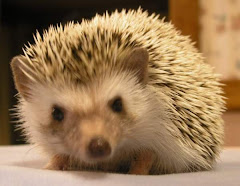
GOOD! While I don't necessarily agree with everything in this article, I certainly don't think a hedgehog is a good pet for small children.
CHICAGO - Warning: young children should not keep hedgehogs as pets — or hamsters, baby chicks, lizards and turtles, for that matter — because of risks for disease.
That's according to the nation's leading pediatricians' group in a new report about dangers from exotic animals.
Besides evidence that they can carry dangerous and sometimes potentially deadly germs, exotic pets may be more prone than cats and dogs to bite, scratch or claw — putting children younger than 5 particularly at risk, the report says.
Young children are vulnerable because of developing immune systems plus they often put their hands in their mouths.
That means families with children younger than 5 should avoid owning "nontraditional" pets. Also, kids that young should avoid contact with these animals in petting zoos or other public places, according to the report from the American Academy of Pediatrics. The report appears in the October edition of the group's medical journal, Pediatrics.
"Many parents clearly don't understand the risks from various infections" these animals often carry, said Dr. Larry Pickering, the report's lead author and an infectious disease specialist at the federal Centers for Disease Control and Prevention.
For example, about 11 percent of salmonella illnesses in children are thought to stem from contact with lizards, turtles and other reptiles, Pickering said. Hamsters also can carry this germ, which can cause severe diarrhea, fever and stomach cramps.
Salmonella also has been found in baby chicks, and young children can get it by kissing or touching the animals and then putting their hands in their mouths, he said.
Study co-author Dr. Joseph Bocchini said he recently treated an infant who got salmonella from the family's pet iguana, which was allowed to roam freely in the home. The child was hospitalized for four weeks but has recovered, said Bocchini, head of the academy's infectious diseases committee and pediatrics chairman at Louisiana State University in Shreveport.
Hedgehogs can be dangerous because their quills can penetrate skin and have been known to spread a bacteria germ that can cause fever, stomach pain and a rash, the report said.
With supervision and precautions like hand-washing, contact between children and animals "is a good thing," Bocchini said. But families should wait until children are older before bringing home an exotic pet, he said.
Those who already have these pets should contact their veterinarians about specific risks and possible new homes for the animals, he said.
Data cited in the study indicate that about 4 million U.S. households have pet reptiles. According to the American Veterinary Medical Association, all kinds of exotic pets are on the rise, although generally fewer than 2 percent of households own them.
The veterinarian group's Mike Dutton, a Weare, N.H., exotic animal specialist, said the recommendations send an important message to parents who sometimes buy exotic pets on an impulse, "then they ask questions, sometimes many months later."
But a spokesman for the International Hedgehog Association said there's no reason to single out hedgehogs or other exotic pets.
"Our recommendation is that no animal should be a pet for kids 5 and under," said Z.G. Standing Bear. He runs a rescue operation near Pikes Peak, Colo., for abandoned hedgehogs, which became fad pets about 10 years ago.









